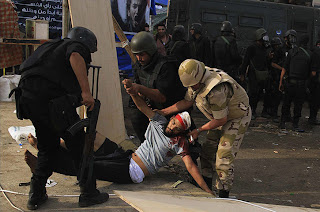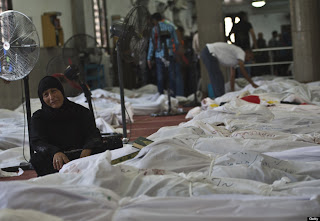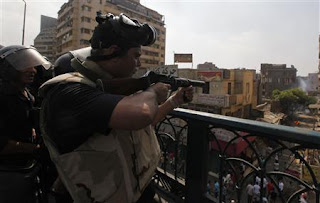The Arab Spring Dies in Egypt
 |
| burned Rabaah al-Adawiya mosque |
When Obama was first elected as President I took a lot of flack from those with illusions in the potential of a Black President for my article ‘Obama – the Black Face of US imperialism’ I was even accused of racism. White liberals often feel guilty at the use of the term 'Uncle Tom' which I used even though, as Joe pointed out, radical Black leaders like Malcolm X regularly assailed Black politicians and time servers as Uncle Toms. The Socialist Workers Party, ever the opportunist, was fulsome in its coverage of Obama’s election. Millions the world over breathed a sigh of relief that the era of George Bush jnr. was over and America’s first Black President had been elected.
 |
| Military show of force in Cairo |
 |
| Child holds up gas cannisters fired at demonstrators |
Yet even the most cynical observer of politics (the BBC excepted of course!) can see that the Western leaders have been exposed as hypocritical war mongers. Apparently Obama has difficulty in deciding whether the removal of a democratically elected civilian President is a coup or not! Black is white and peace means war, as Orwellian doublethink becomes the order of the day.
 |
| injured member of MB carried by riot police |
 |
| Police storm al-Fath mosque |
What this meant was the militarisation of the struggle. Instead of mass popular movements that might go on to challenge the existing economic order and in particular imperialist domination of Arab oil, the West decided to arm one or more factions of the opposition. Instead of a mass movement to oust Assad and Ghadaffi, we saw a military conflict aided by Western air power.
Egypt proves, if proof were needed, that in the Arab and Gulf States, reformism has no possibility of succeeding. The structure of politics and western interests mean that the struggle is all or nothing. There can be no Egyptian Kerensky or Attlee.
 |
| Women mourns death of her daughter |
No one doubts that the government of Mohammed Morsi in Egypt was truly awful. Morsi saw himself as the next pharaoh and devised a constitution that gave the President absolute power. Sharia law and the encroachment of Islamic law, which is nothing but a façade for the legitimation of repression and the entrenchment of economic power in the hands of sections of the petit-bourgeois its clerical offshoot was something that Morsi and the Egyptian Muslim Brotherhood proposed and intended.
 |
| MB volunteer sleeps amongst shrouds |
However those millions of Egyptians who hated Morsi, were wrong to support a military take-over in Egypt. It is staggering that such a large section of society seems to have learnt nothing from the days of Mubarak. The Egyptian army and police are the deadly enemies of any popular or democratic movement. They who supported Mubarak and it is noteworthy that the charge against Morsi is that he and his followers used violence against their gaolers when they made their escape from prison.
General Sisi even compares himself to President Gamal Abdel Nasser, the leader of the Free Officers who ousted the pro-British King Farouk. Those taken in by this comparison know nothing of their own history. Nasser nationalised the Suez Canal in 1956 and was faced with a triple invasion by Israel, Britain and France. All of this was plotted in Sevres near Paris. Israel did the bidding of the two powers, though Ben-Gurion was openly skeptical about whether he would be betrayed, and attacked on cue and Britain and France imposed themselves as ‘peacekeepers’ bombing Port Said in the process! The British Prime Minister Anthony Eden, who presided over the Suez disaster, will go down as the worst prime minister of the last century (except for Gordon Brown).
The United States under Eisenhower used the Suez invasion to oust the British from the Middle East. When Britain and France began bombing the US took both countries to the UN and only by use of their veto did the Security Council not censor them. But Eisenhower engineered a run on the pound, in the days when there was still a sterling area and both imperialist powers were forced to withdraw from Egypt. When David ben-Gurion chafed at the idea of a withdrawal of Zionist forces, Eisenhower memorably said that it was not for those who are guilty of aggrandizement to set conditions on their own withdraw, something we should remember today.
Nasser was the most popular political leader Egypt ever had, even when defeated by Israel in 1967, because he stood up to imperialism. When he resigned in 1967 popular demands led to his reinstatement. Sisi on the other hand has only stood up to the Egyptian masses – the Muslim Brotherhood today but workers, socialists and women tomorrow. Those who supported the military coup will not be able to complain when the military turns against them.
The massacre of Morsi’s supporters, maybe 2,000 have been killed, bodes ill for the future. Army and police guns may be turned on Islamists today but they will target workers and socialists in the future. Of course there are some in the Egyptian middle classes who supported Sisi’s actions, who also supported Mubarak. But Sisi and SCAF (Supreme Council of the Armed Forces) still pretend that they are continuing the Arab spring whilst making it clear that violence against the armed forces is a deadly crime (though massacring unarmed demonstrators is quite acceptable).
The hypocrisy of western leaders should be obvious to anyone who is not blind. Rhetoric about a ‘war for democracy’ is limited by their own greed and interests. However the Arab masses have their own interests.
Imperialism seeks to divide people on confessional lines. It is essential that any popular movement in Arabia has emblazoned on its banner opposition to confessionalism. It is also crucial that the existing state forces are disarmed. The mistake in Egypt was to limit the struggle to Mubarak. But even then those seeking revolution and the overthrow of Zionism in the Middle East face an enormous problem. The bastion of counter-revolution in the region resides in Saudi Arabia. From the time of Nasser to today the Saudi ruling class has been active in opposing any popular movements and were unhappy at the removal of Mubarak. Today, thanks to people like Edward Snowden, this fundamentalist government is exposed as having strong links with Israel, supporting and encouraging the bombing of Iran, just as it supported the Phalange in Lebanon's civil war. It is now a major supporter of the military in Egypt and is funding them. The Wahabi rulers of Saudi Arabia are, when not governing, to be found in the nightclubs and brothels of the West. A poor man who steals a loaf of bread can have his hand and legs amputated whilst the real thieves in society are its rulers.
Western policy in the Arab East, from the earliest times, have been to separate the people from the oil. This was one reason why whole western armies were transplanted to Saudi Arabia to fight the first Gulf War, as a result of Saddam Hussein’s annexation of Kuwait. Overcoming this obstacle is crucial to the success of any revolution in the region. Part of the same problem is the sectarian nature of much of Arab politics.
In Iraq, the US overcame the armed resistance through encouraging and perpetrating civilian massacres and car bombings. It is one of the ironies of the ‘war against terror’ that whilst nominally fighting Al Queda, in Libya, Iraq and now Syria, they have used them to foster sectarian violence. It demonstrates that the increased use of western forces in the region is legitimised by a bogus excuse. Whilst Arab fought and killed Arab in Iraq, the US forces took stock and increased their own power. In Faluja, the centre of the resistance, the US carried out a massacre as they sealed the city off. Torture centres and prisons, of which Abu Ghraib was not the worst, were set up.
In the Gulf, the local population is not and will not become revolutionary. Of course in places such as Bahrain and Saudi Arabia, the Shiite masses have that possibility, if they resist the temptations of sectarianism. In Bahrain Saudi troops were sent at one point to the aid of King Hamad. But the centre of any mass movement has to be the thousands of migrant workers in the Gulf. Of course there are real problems with this strategy, not least that it is easy to deport workers from the Philippines or Thailand.
As the Egyptian Armed Forces prepare for further massacres, the burning need is for imperialism to be placed at the centre of the struggle.
Tony Greenstein
